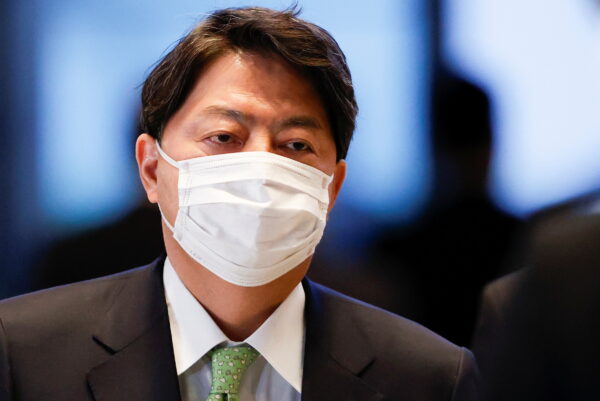Japan will impose export restrictions on 23 semiconductor manufacturing equipment, the government said on Friday, amid an ongoing spat between the United States and China over chip technology.
The export control measures will take effect in July and cover equipment for cleaning, checkups, and lithography—a key technology in manufacturing advanced semiconductors—according to the Ministry of Economy, Trade and Industry (METI).
“It is to prevent our technology from being diverted for military use,” METI Minister Yasutoshi Nishimura told reporters, Kyodo News reported. “We will fulfill our responsibility to the international community.”
Japan said that 42 countries, including the United States and Taiwan, will continue receiving the equipment under a simplified export measure. But China was not among them and will be subject to stricter controls.
The new regulation will affect equipment manufactured by 10 Japanese companies, including Tokyo Electron Ltd. However, Nishimura said he expected minimal impact on local companies as the rules only target “extremely advanced” technology.
“We expect the impact on domestic companies to be limited,” Nishimura said. “We don’t have one specific country in mind with these measures.”
Chinese Foreign Ministry spokesperson Mao Ning criticized Japan’s move, saying that “weaponizing trade and tech issues and destabilizing the global industrial and supply chains benefit no one and will eventually backfire.”
Ahead of Japan Minister’s Visit
The move came ahead of Foreign Minister Yoshimasa Hayashi’s visit to Beijing this weekend for talks with his Chinese counterpart Qin Gang, the first such visit by a Japanese foreign minister in three years.

According to the Chinese Foreign Ministry, the two leaders will have “in-depth exchanges of views on bilateral relations and international and regional issues of shared interest.”
Advanced semiconductor chips are used to make everything from pickup trucks to hypersonic missiles. Currently, more than 60 percent of the world’s supply of chips is produced in Taiwan, many of them with the help of U.S. research and design.
Japan once dominated chip production but has seen its market share slip to about 10 percent. Still, it remains a major supplier of chipmaking machines and semiconductor materials.
Major Win For US
Japan’s export controls will be seen as a major win for the United States, which in October imposed sweeping restrictions on access to chipmaking technology to slow China’s technological and military advances.
Washington needs the cooperation of industry heavyweights Japan and the Netherlands for its measures to be effective and to ensure its companies do not face a competitive disadvantage.
The Netherlands had agreed to block Beijing from having access to chip manufacturing technology, such as from ASML Holding NV, which dominates the market for lithography systems used to create chips’ minute circuitry.
The Minister for Foreign Trade and Development Cooperation, Liesje Schreinemacher, told the Dutch parliament on March 8, that the proposed limitations on China’s access to sensitively designed advanced equipment using ultraviolet light, to etch circuits on processor chips, was essential on security and human rights grounds.
She said the new measures target only “very specific technologies in the semiconductor production cycle on which the Netherlands has a unique and leading position, such as the most advanced Deep Ultra Violet (DUV) immersion lithography and deposition.”
Schreinemacher said the government would publish the new regulations “before the summer.”
The Chinese communist regime accused “an individual country,” in a reference to the United States, of trying to “safeguard its own hegemony” by abusing national security as an excuse to “deprive China of its right to development.”
Mao Ning warned that the restrictions would “limit normal economic and trade exchanges between Chinese and Dutch companies.”
Bryan Jung, Andrew Thornebrooke, and Reuters contributed to this report.








